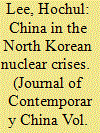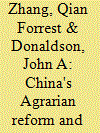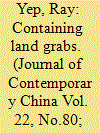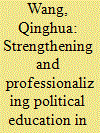|
|
|
Sort Order |
|
|
|
Items / Page
|
|
|
|
|
|
|
| Srl | Item |
| 1 |
ID:
123966


|
|
|
|
|
| Publication |
2013.
|
| Summary/Abstract |
China reacted very differently to the first and second North Korean nuclear crisis: engaging in passive and 'behind-the-scenes' diplomacy in the first and choosing more proactive and 'stage-managing' diplomacy in the second. This article has sought to explain this striking contrast in China's foreign behavior. Though most studies tend to rely on Chinese strategic and security interests in explaining China's proactive diplomacy as demonstrated in the six-party talks, those strategic and security interests do not explain directly the contrasting foreign behavior of China. China faced basically equal strategic and security concerns and equally dangerous potential military conflict between the US and North Korea through the first and the second nuclear crises. This article, then, argues that 'same interests, but different behaviors' should be explained not by China's external interest calculus but by internal changes within China itself. By the turn of the new millennium, China had undergone an evolutionary change of state identity from a cautious accommodator to an active constructor, or from a state of 'taoguang yanghui' to a state of 'fuzeren daguo'. The contrasting foreign behaviors in the first and second nuclear crises are profoundly reflective of this identity shift of China.
|
|
|
|
|
|
|
|
|
|
|
|
|
|
|
|
| 2 |
ID:
123963


|
|
|
|
|
| Publication |
2013.
|
| Summary/Abstract |
Many reporters and scholars outside China advocate the privatization of land ownership in China as a necessary step for the transformation of China's agriculture system into a modern, large-scale, market-oriented and technology-intensive one. Chinese scholars advocating land privatization, for their part, typically argue that land privatization would better protect farmers' rights and interests. We present a contrarian view to these calls for land privatization. Under China's current system of collective land ownership and individualized land use rights, agriculture has modernized rapidly in China in a way that has avoided privatization's many downsides. Land privatization, by contrast, would only exacerbate class inequality and social tension in rural China and further weaken farmers' positions in dealing with more powerful actors. Through analyzing six dimensions of this issue-increasing investment in land and agricultural productivity, promoting scaled-up modern agriculture, protecting farmers' land rights and preventing land grabs, enhancing rural livelihoods, and facilitating rural migrants' integration into cities-we maintain that strengthening the current system is superior to privatizing rural land.
|
|
|
|
|
|
|
|
|
|
|
|
|
|
|
|
| 3 |
ID:
123964


|
|
|
|
|
| Publication |
2013.
|
| Summary/Abstract |
To a certain extent, a more stringent regime for requisition of rural land may help protect the interests of peasants. There is, however, a hierarchy of income opportunity in the countryside as a result of diversification of rural economic structure in reform China. The varying degree of land dependence renders a contrasting calculation on the value of land lease among Chinese peasants. For peasants in the more prosperous regions, the conflicts are primarily triggered by their exclusion from direct engagement in the land market and deprivation of the chance to maximise potential gain that fuels the growing tension in the countryside. A more direct response to this fundamental cause, however, requires audacious moves by the Party leadership venturing into zones of political taboo.
|
|
|
|
|
|
|
|
|
|
|
|
|
|
|
|
| 4 |
ID:
123959


|
|
|
|
|
| Publication |
2013.
|
| Summary/Abstract |
This paper analyzes the determinants of Chinese government support for methanol automobile fuel development. At the national level, a preference for low carbon alternatives, ongoing bureaucratic restructuring, and profitability concerns of the national oil companies (NOCs) help to explain a lack of support for methanol fuel. At the local level, a short-term and localized view of industry development explains why some governments actively promote methanol fuel through local standardization, subsidies, and management of NOC opposition. The case of methanol fuel illustrates how local governments with strong, embedded interests have filled in the national-level policy vacuum on this issue. These findings contribute to the ongoing debate on the evolving central-local relations in China and hold lessons for alternative fuel adoption efforts underway in many parts of the world.
|
|
|
|
|
|
|
|
|
|
|
|
|
|
|
|
| 5 |
ID:
123960


|
|
|
|
|
| Publication |
2013.
|
| Summary/Abstract |
The purpose of this paper is to look into the transformation of local innovation systems in the high-tech parks of Shanghai and Beijing and their technological learning and upgrading. The areas that we have chosen to investigate are Beijing's Zhongguancun and Shanghai's Yangpu District. The main reason that we selected these two areas for study is because they are home to most of the top universities and R&D institutes in these two cities. Our main focus will be on how institutions-the local state, inter-firm relations and the relationship between R&D institutions and firms-are co-evolving to shape and constrain a local system of innovation. Our research finds that the capacities and autonomy of the Zhongguancun of Beijing's Haidian District and Yangpu District of Shanghai differ in various aspects, but both regions are struggling to upgrade innovation and enhance economic development. The 'high-tech cluster' provides a useful instrument or label to achieve goals other than innovation and R&D. Elite universities are regarded as engines for network formation, but visible and invisible walls of Chinese universities discount efforts to foster a university-centered innovation hub which especially shows in the Yangpu case.
|
|
|
|
|
|
|
|
|
|
|
|
|
|
|
|
| 6 |
ID:
123961


|
|
|
|
|
| Publication |
2013.
|
| Summary/Abstract |
This article joins the debate on the increasingly consultative nature of Chinese politics by adding the role of the Local People's Congress (LPC). In contrast to previous research on LPCs that emphasizes their increasing importance and improved capacity, this article shows that the central Party leadership, in order to uphold its monopoly of the cadre management system, has reduced LPC standing committees' (LPCSC) influence over cadres. The article analyses the consequences of the People's Congress Standing Committee Supervision Law passed in 2006 and the policy of appointing the first Party secretary as LPCSC chairperson. A case study of the changes over a ten-year period (1998-2009) in a county People's Congress (PC) in Zhejiang illustrates how the change in leadership and the implementation of the Supervision Law effectively stopped previously initiated reforms to strengthen the LPC and crippled the LPCSCs' capacity to supervise government cadres. The article concludes that the policies adopted in order to strengthen Party control over LPCSCs have resulted in a decrease of horizontal accountability and confirm the image of an emerging consultative authoritarian political system.
|
|
|
|
|
|
|
|
|
|
|
|
|
|
|
|
| 7 |
ID:
123968


|
|
|
|
|
| Publication |
2013.
|
| Summary/Abstract |
The present study traces the cultural and political contexts within which Beijing considers global governance. They include: (1) Confucian dispositions toward non-interventionism and self-governance; (2) the socialist collectivist ethics that stress persuasion instead of unilateralism; (3) a lingering sense of inferiority arising from underdevelopment that harms self-confidence; and (4) the repugnant experiences with the United Nations (UN) and the United States that have dominated most international organizations since World War II. The consequential Chinese style of global governance is reactive rather than proactive, problem-solving rather than goal-driven, and attentive to obligation and reform more in other major countries than in failing states. That said, China could still assert global leadership by acting as a model of self-governance for other major countries and by intervening in failing states only through closed-door persuasion and exemplification as opposed to open sanctioning.
|
|
|
|
|
|
|
|
|
|
|
|
|
|
|
|
| 8 |
ID:
123958


|
|
|
|
|
| Publication |
2013.
|
| Summary/Abstract |
Since the early 1980s, Chinese local governments have collected a significant amount of revenue outside the budgetary system. Fiscal shortage is commonly cited as the main reason for local extra-budgetary finance. However, a panel data analysis on provincial extra-budgetary practices reveals a different story. The findings suggest that extra-budgetary finance exists in China not as a strategy for local fiscal survival, but rather because local bureaucracies can conveniently exploit their administrative power to extract revenue from the local economy, and that extra-budgetary exactions fall disproportionately on peasants. Despite the constant calls by the central government to reform and regulate the extra-budgetary system, the centrally issued administrative directives have little impact on local practices.
|
|
|
|
|
|
|
|
|
|
|
|
|
|
|
|
| 9 |
ID:
123967


|
|
|
|
|
| Publication |
2013.
|
| Summary/Abstract |
Party control over higher education in reform-era China has been a relatively neglected topic in the extant literature. Seeking to remedy this neglect, this article focuses on an aspect of the topic that has remained unstudied in Western scholarship: namely, the post-1989 regime's efforts to strengthen and professionalize political education (PE) in universities by intensifying the 'disciplinary construction' of PE. The article finds that these efforts have been partially successful in meeting the regime's objectives. The training of PE teachers has been considerably professionalized; PE courses have become more attractive and effective; and more students tend to accept the Party-sponsored views and policies taught in PE courses, and to support Party leadership.
|
|
|
|
|
|
|
|
|
|
|
|
|
|
|
|
| 10 |
ID:
123965


|
|
|
|
|
| Publication |
2013.
|
| Summary/Abstract |
Our study examines the nature and development of microblogging in China. By adopting a Gramscian thesis of 'hegemony', we argue that the Chinese regime is facing a crisis of hegemony and the emergence of the microblogosphere has provided a platform for the war of position to establish counter-hegemony. The main features of microblogging in China are the emergence of opinion leaders, the close involvement of traditional media, and a more passive role of the state in the microblogosphere. The predominant liberal leaning of the microblogosphere has illustrated the emergence of counter-hegemony, where government connection is an instant negativity. The regime can exercise censorship but has lost ideational leadership.
|
|
|
|
|
|
|
|
|
|
|
|
|
|
|
|
|
|
|
|
|